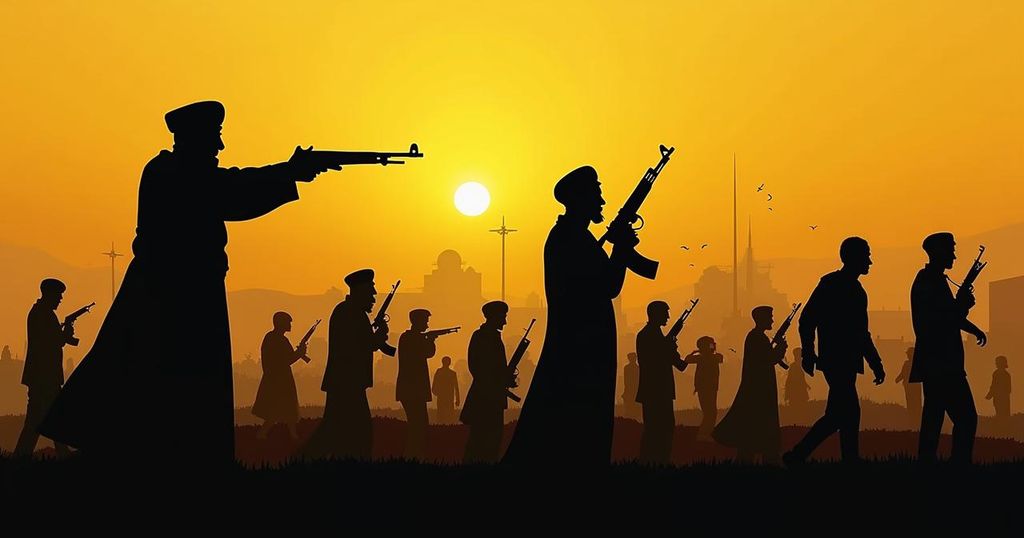Middle East Leaders React to the Assassination of Hezbollah’s Hassan Nasrallah

Hassan Nasrallah, leader of Hezbollah, was killed in an Israeli airstrike in Beirut, eliciting strong reactions across the Middle East. Hezbollah and regional allies condemned the attack, while leaders like Ayatollah Khamenei and Turkish President Erdogan spoke out against Israeli actions. The strike raises tensions amid ongoing conflict, with repercussions anticipated for Iran and Hezbollah’s responses.
The recent assassination of Hezbollah leader Hassan Nasrallah has elicited a robust response across the Middle East. Nasrallah was killed on Friday during a targeted Israeli airstrike in the southern suburbs of Beirut, which involved the use of approximately 80 bombs, including advanced bunker-busting munitions. Initial reports from Lebanon’s Health Ministry indicate that at least 11 individuals perished in the attack, and over 100 suffered injuries. Among the casualties was Abbas Nilforoushan, the deputy commander of Iran’s Islamic Revolutionary Guard Corps, who had previously faced sanctions from the United States for his role in suppressing protests in Iran. Following the incident, Hezbollah issued a statement mourning Nasrallah as a “brave martyr” and honoring his nearly three decades of leadership. The Israeli military characterized their operation against Nasrallah as a significant blow to Hezbollah’s command structure, which has been increasingly vulnerable due to ongoing strikes. Israeli Defense Minister Yoav Gallant remarked on the operation, stating, “This operation closed a long-standing reckoning with the master murderer Nasrallah.” Iran’s Supreme Leader, Ayatollah Ali Khamenei, condemned the assassination and urged Muslims to unite with Hezbollah in confronting Israel, declaring, “The fate of this region will be determined by the forces of resistance.” In solidarity, Hamas also denounced the assassination, referring to it as a “cowardly act of terrorism” and highlighting the brutality of the Israeli regime. Yemen’s Houthis expressed their condolences, asserting that Nasrallah’s death would only serve to strengthen their resolve in the fight against perceived oppression. Furthermore, Lebanon’s caretaker Prime Minister Najib Mikati announced a three-day mourning period, asserting that the nation faces imminent danger. Former Lebanese President Michel Aoun expressed sorrow over the loss and reiterated the need for national unity in response to ongoing aggression. International reactions also poured in, with Turkish President Recep Tayyip Erdogan criticizing Israel’s increasing recklessness, and leaders from Iraq and Syria declaring days of mourning for Nasrallah. Conversely, U.S. President Joe Biden expressed that the assassination provides a measure of justice for Nasrallah’s numerous victims, affirming American support for Israel’s right to defend itself against groups such as Hezbollah. In the aftermath of Nasrallah’s death, speculation arises regarding potential Iranian retaliation, although Iranian officials have indicated a preference for avoiding larger conflicts. Hezbollah responded by launching approximately 90 rockets into northern Israel, reflecting ongoing tensions amidst the Israeli military’s operations, which have reportedly resulted in over 700 deaths in Lebanon to date.
The context of this incident lies in the longstanding conflict between Israel and Hezbollah, a militant group supported by Iran. Nasrallah, who led Hezbollah since 1992, played a pivotal role in the group’s resistance against Israeli forces. The assassination signalizes an escalation in Israeli efforts to undermine Hezbollah’s leadership amidst a broader regional conflict involving Iran, Hamas, and various proxy groups across the Middle East. The incident has further highlighted the precarious balance of power in the region, with reactions illustrating deep divisions and alliances among states and non-state actors.
The assassination of Hassan Nasrallah represents a significant turning point in the geopolitical landscape of the Middle East. It has provoked widespread condemnation from regional leaders and groups, signaling solidarity against Israel’s actions. While the Israeli government touts this operation as a landmark achievement, it simultaneously escalates tensions with Iran and its affiliates. The response from Iran and Hezbollah will likely shape future interactions in the region, with the potential for heightened conflict. As regional dynamics evolve, the repercussions of Nasrallah’s death may significantly impact the ongoing confrontations and alliances in the Middle East.
Original Source: www.al-monitor.com








